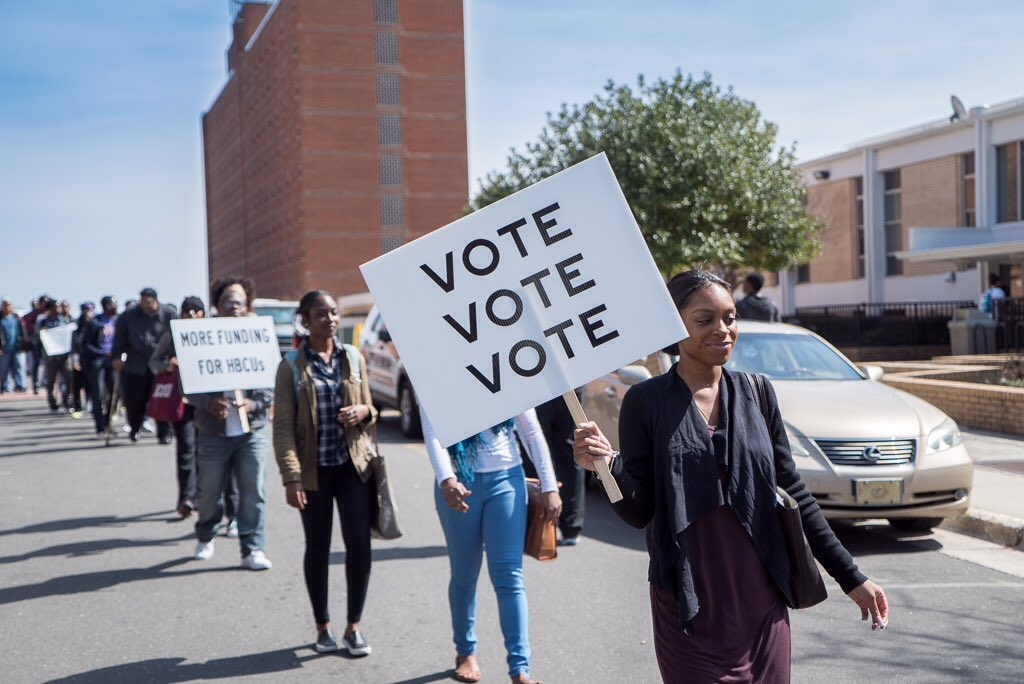As young voter participation has grown, so have Southern states' efforts to curb it

Students at North Carolina Central University in Durham marched to the polls for early voting during the 2016 election season. North Carolina is among the Southern states where legislatures have passed laws in recent years that would discourage voting by students. (Photo via the North Carolina Central University Twitter page.)
Younger voters represent a larger percentage of the nation's electorate today than their older counterparts, with millennial or Generation Z voters making up nearly 40% of the potential 2020 electorate.
Historically, younger voters have participated in elections at lower rates than older voters. But now a new trend has emerged of increasing voter participation among the young. In 2018, for instance, youth voter turnout nationally rose 16 percentage points from the last midterm election, making it the highest level of midterm participation among young voters in the past quarter-century. This trend is also seen in Southern states: In 2018, for example, Georgia saw a 20 percentage-point increase in young voter participation over the 2014 midterms, while Texas tripled the 2014 young voter turnout rate of 8.2%.
Now experts are predicting ahead of the 2020 election that youth voter turnout will reach levels reminiscent of the 2008 election, when nearly 53% of all eligible 18-to-29-year-olds cast ballots.
But amid this surge in participation among young voters, Republican-led legislatures in the South have continued to erect barriers to voting that disproportionately affect youth. They include strict voter identification laws and registration restrictions, as well as closures of campus polling places.
According to the Campus Vote Project, of the 17 states that have passed laws in recent years requiring voters to show IDs to cast a ballot, seven refuse to accept student IDs, including South Carolina, Tennessee, and Texas. In Tennessee, a faculty ID is an acceptable form of voter identification but a student ID is not. And in Texas, student IDs from public universities are not accepted for voting while gun licenses are.
Last year, Tennessee's GOP-controlled legislature also passed a law that imposed criminal and civil penalties on organizations that hold voter registration drives if they return incomplete applications or fail to comply with certain requirements. The law could hurt voter registration drives on college campuses, said Erika Burnett, the regional program manager with the nonprofit Andrew Goodman Foundation, which provides stipends to campus organizers across the South for on-campus civic engagement.
The law sparked legal challenges, and a federal judge has blocked its implementation for this year's elections, saying it would have a "chilling effect" on registration efforts.
Now Tennessee lawmakers are attempting to institute new restrictions on voter registration. The proposals would require the state to offer voluntary training on voter registration laws, require voter registration applications to be submitted within 15 days of a voter registration drive, and prohibit the use of voter information for non-political purposes.
The proposals were approved last week by the House Elections and Campaign Finance Subcommittee and now head to the full House Local Committee. If approved, they would likely go into effect before the state's primary election in August.
An epidemic of suppression
Tennessee is not alone in embracing laws that discourage youth voting. In 2014, Florida's Republican secretary of state banned early-voting sites at state universities. A federal judge overturned the ban in 2018, saying it created a "lopsided burden on college students." But last year the state legislature effectively reinstated the ban with a new law that requires early voting sites to have "sufficient non-permitted parking," which many college campuses lack. Voting rights advocates sued to block the new law, and the case is now in the courts.
In North Carolina, after voters approved a constitutional amendment in 2018 requiring an ID to vote, Republicans lawmakers enacted a law that accepted student IDs but created burdensome requirements for them that many state universities were unable to meet. For example, it mandated that the photo used on the ID be taken by the university itself, even though many institutions let students use their own photos. It also required that universities submit an attestation letter that said the student IDs were issued after verifying students' citizenship status, Social Security number, and birthdates. The outcry over the law forced state lawmakers to relax the requirements, but confusion remained. The entire law is now on hold amid legal challenges.
Meanwhile in Texas, the Republican-controlled legislature last summer passed House Bill 1888, which effectively bans mobile or temporary polling places by requiring polling locations to be open on all early voting days. The temporary polling places helped provide access to rural communities as well as college students.
For example, three different college campuses in Austin — Huston-Tillotson University, St. Edward's University, and Austin Community College — had mobile voting locations available in the 2018 elections. With that system now unavailable, these students could have more trouble casting a ballot in the upcoming election. Texas holds its primary on March 3's Super Tuesday.
Supporters of the measure argued that it was intended to prevent local government officials from making it easier for some people to vote while blocking others, but Democrats saw it as just another attempt to suppress turnout. "Republicans know Texas is changing," Gilberto Hinojosa, chair of the Texas Democratic Party, said at the time. "That's why they're trying to change the rules to make it harder for college students, seniors, the disability community, rural Texans, and survival of natural disasters to cast their ballots."
Last October, state and national Democrats filed suit over the Texas law. Citing the impact it would have on younger voters in the 2020 election, the plaintiffs are seeking an injunction. The matter remains in court.
Tags
Benjamin Barber
Benjamin Barber is the democracy program coordinator at the Institute for Southern Studies.
